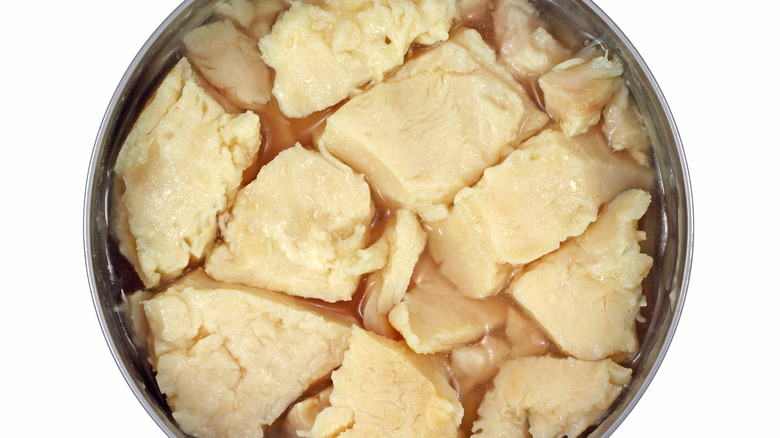This Canned Protein Isn't As Healthy As You Thought
Canned protein can be a lifesaver when you don't have the 30+ minutes to spare to bake raw meat or poultry in the oven. Generally speaking, canned fruits, veggies, and legumes like tomatoes, garbanzo beans, and pumpkin can be great healthy options (via Healthline). But can the same be said for canned proteins? As long as meat or fish is packed with brine or water rather than oil or sauce, canned protein is a solid choice. However, there are certain benefits and drawbacks to consider when it comes to canned chicken.
Let's start with the benefits, the most apparent being that canned chicken counts towards your recommended daily intake of protein, which is 0.8 grams of protein per kilogram of body weight, explains Harvard Health. Canned chicken also contains essential nutrients like B vitamins, zinc, magnesium, and iron, reports the U.S. Department of Agriculture (USDA). As a protein, canned chicken ultimately supports healthy bones, skin, blood, muscles, and more. What isn't so healthy, however, is the fact that canned chicken can come with high amounts of sodium.
Canned chicken can be packed with sodium
The USDA reports that in one 5-ounce can of chicken without the broth, there's 602 milligrams of sodium. If you were to compare the sodium content of 100 grams of canned chicken to a same-sized serving of cooked-from-raw chicken breast with no skin, there's over a 100-milligram difference between the two. There are 482 milligrams of sodium in 100 grams of canned chicken, and 100 grams of skin-free cooked chicken breast have 360 milligrams of sodium (via USDA).
While sodium is important for our body's functioning, overconsumption can potentially lead to health problems. The Mayo Clinic reports that the maximum recommended daily intake for sodium is no more than 2,300 milligrams for those at least 14 years of age. Experts point out that a great deal of our sodium intake can be traced to prepared foods. While the fact that canned chicken is fully cooked is what makes it so convenient, it also counts as a prepared food.
Canned chicken often contains additives
Canned chicken can also come with additives such as sodium phosphate, explains Hone Health. Although more study is needed, 2014 research published in Advances in Chronic Kidney Disease outlines how overconsumption of sodium and phosphorus-based preservatives has been associated with cardiovascular and bone diseases in patients with chronic kidney disease (CKD). Additionally, many canned chicken products come packaged in metal cans that have been lined with BPA. The U.S. Food and Drug Administration (FDA) reports that small amounts of the chemical may leach into foods, but that such small amounts are considered safe for consumption. Even so, the use of BPA in canned food product packaging has been a topic of controversy, with some research suggesting BPA consumption may pose various different health risks.
The final reason that industrial-sourced canned chicken may not be the healthiest of options is because the animals are often raised in close quarters, such as through factory farming, which can increase the risk of contamination and infection, nutritionist Serena Poon told Eat This, Not That! To reduce this risk, the chicken is treated with antibiotics, which may raise the risk of certain health issues.



